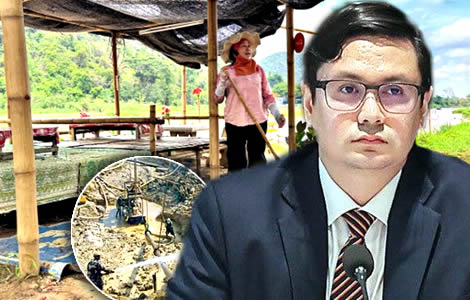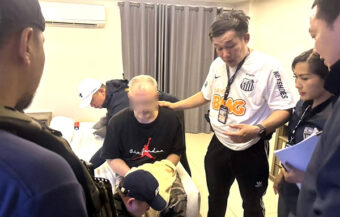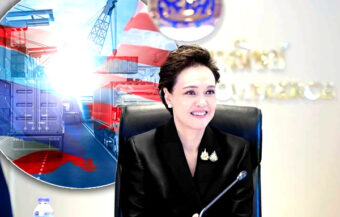Arsenic from Wa State gold mining poisons Chiang Rai’s Kok River, threatening thousands of families and businesses. Thai ministers will meet on May 27 to address the crisis. Locals face rising health risks and severe economic damage from pollution crossing the border.
Top ministers are preparing to meet on Tuesday, May 27th, at Government House to address a growing crisis on Thailand’s border with the Wa State. This territory is officially controlled by Myanmar but effectively governed by the Wa State. The issue centres on Chinese mafia capital flowing into gold mining operations just across the border from Chiang Rai. These operations take place in an area controlled by the powerful Wa military, which is backed by China. The key concern is that the River Kok—on which thousands of families and local businesses in Chiang Rai depend—is being poisoned by rising arsenic levels. This contamination has already caused an environmental disaster and severely damaged many riverside businesses, including restaurants. The livelihoods of many locals are at serious risk.

Chiang Rai is facing an escalating environmental crisis. Arsenic contamination has poisoned the Kok River, which flows through the heart of the province. Authorities say the toxic heavy metal came from unregulated gold mining in Myanmar’s Wa State.
The Pollution Control Office Region 1 (EPCO), based in Chiang Mai, confirmed the alarming discovery in early April. Water samples from the Kok River in Mae Ai District showed arsenic levels of 0.026 milligrams per litre—more than double Thailand’s legal limit of 0.01. No cyanide was detected, but experts say the real danger lies in long-term exposure.
Locals face economic hardship and health risks as arsenic pollution devastates tourism and fishing industries
“Arsenic builds up in the body over time,” said EPCO Director Aweera Phakamat. “It can damage organs and increase cancer risk.” He added that the contamination can also affect aquatic life. “Fish absorb arsenic. People who eat them could be exposed without knowing.”
Communities along the river are already feeling the impact. Chiang Rai Beach, once a Songkran hotspot, is now deserted. Food stalls that relied on tourists have closed. Others are barely holding on.
“I’ve been here since 1992,” said 72-year-old Ms. Buale Srichoti, who runs a riverside eatery. “This is the worst I’ve ever seen. No tourists, no income, nothing.” She pointed to her empty tables. “I used to earn enough to feed my whole family. Now, I can’t pay the rent.”
Her struggle reflects a larger problem. Rob Wiang Subdistrict Administrative Organisation, which manages the riverside market, said vendors are desperate. Many borrowed money to build Songkran booths. Now, they face debt with no customers in sight.
Fear of contamination grows as locals avoid river while toxic pollution comes from gold mining in Wa State
Moreover, fear is spreading quickly. Locals say people avoid the river completely. “They think touching the water will make them sick,” Ms. Buale said. “They don’t even want to sit near it.”
The pollution isn’t homegrown. It flows from across the border in Myanmar. Specifically, it comes from Wa State, a self-governing region outside the control of Myanmar’s central government. The area is run by the United Wa State Party (UWSP), which has its own military and strong ties to China.
For years, Wa State was infamous for narcotics. But recently, it has shifted to gold mining. While lucrative, the mining has devastated nearby rivers. Wastewater, chemicals, and sediment pour directly into the tributaries. These lead into the Kok River, which runs into Chiang Rai.
Thai officials say satellite imagery and local tip-offs confirmed the source. Lieutenant Colonel Boonrot Kongkaew, Mayor of Thaton Subdistrict, was blunt. “This is foreign pollution,” he said. “We’re paying for someone else’s mess.”
Government criticised for response while Rangsiman pushes diplomatic pressure on Myanmar and China
Yet the Thai government is under fire for reacting too slowly. MP Rangsiman Rome of the People’s Party visited Chiang Rai earlier this month. He demanded stronger action. “The source of the problem is outside Thailand,” he said. “But we cannot allow our people to suffer without help.”
Rangsiman has launched a three-point action plan. First, he formed a working group of Chiang Rai MPs and state agencies. Their goal is to coordinate a direct response. Second, he’s pushing for better inter-agency communication and data sharing. Third, he’s urging diplomatic pressure on Myanmar and China.
Meanwhile, the Wa State authorities are licensing more operators backed by Chinese capital. Certainly, no thought is given to the impact downstream on Thailand.
According to Rangsiman, the cross-border nature of the crisis requires urgent diplomacy. “We must negotiate with Myanmar. We must speak with China. Otherwise, this will only get worse.”
Meanwhile, Deputy Prime Minister Prasert Chantararuangthong has stepped in. On 22 May, he signed an emergency order to create a special subcommittee under the National Environment Board. The panel includes the Ministers of Interior, Defence, and Natural Resources. Their first meeting is scheduled for 27 May at Government House.
Subcommittee formed to identify pollution sources and fixes to reduce damage to environment and health
This subcommittee has a clear mission. First, it must identify the source of the pollution. Then, it must propose urgent measures to reduce the damage. These include building sediment traps, improving filtration systems, and possibly slowing the river’s flow.
However, critics say that’s not enough. “You can’t solve this with sandbags,” said environmental health expert Somporn Phengkham. “We need sediment analysis, water testing, and mercury checks. Arsenic may be just one of many toxins.”
She said mercury often accompanies gold mining. “It can enter the food chain through catfish and predators. This could affect pregnant women and children first.”
Somporn runs the Community Health Impact Assessment Platform (CHIA). Her team is calling for widespread testing in affected communities. “Don’t wait for people to fall sick,” she warned. “We need to test the fish, the soil, and even the air.”
Even the Defence Ministry is involved. Deputy Prime Minister and Defence Minister Phumtham Wechayachai proposed building barriers to control the river’s flow. Although temporary, such measures could stop contaminants from spreading further.
Wa State’s independence and Chinese backing complicate efforts to control toxic pollution crossing into Thailand
But problems remain. Wa State is not subject to Myanmar’s laws. Its militia—the United Wa State Army—acts independently. Thai authorities admit they cannot cross the border or influence the area directly.
Wa’s links to China complicate matters. The gold mines are believed to be backed by Chinese investors. According to locals in Shan State, trucks regularly haul ore to nearby smelters. Mining runoff then flows into the river unchecked.
Residents in Thai border districts say they’ve raised concerns for years. But little has changed. In Wiang Kaen, Thaton, and Mae Ai, villagers say water quality has dropped and fish have disappeared. “We don’t even let our kids swim anymore,” said one parent in Thaton. “The water smells strange.”
In Chiang Rai town, officials are scrambling to reassure the public. They insist municipal tap water remains safe. But with bottled water sales surging, confidence is low.
Business owners demand financial relief as economic losses mount, while public health fears continue to grow
Business owners are also calling for financial relief. “We’ve lost everything,” said a stallholder who asked not to be named. “We want compensation, or at least debt relief. We did nothing wrong.”
Rangsiman agrees. “The state must help. These are not rich people—they can’t wait months for bureaucracy.”
The upcoming subcommittee meeting could mark a turning point. Officials are expected to discuss emergency funds, water treatment upgrades, and a public health campaign. The Environment Ministry has also promised to send more testing kits.
Thailand a battery or conduit for the world’s largest drug source, the Wa State, says People’s Party MP
Peace breakthrough as Malaysian PM Anwar Ibrahim secures prisoner releases and new ceasefire in Burma
Status of Burma’s General Saw Chit Tu in Thailand may be a further issue in future US-Thai talks on security
Still, for residents like Ms. Buale, the damage has been done. “I just want the river back,” she said. “I want families to come to eat and laugh like before. But now? We’re scared. We feel forgotten.”
Unless the mining upstream stops, experts warn, this will not be the last crisis. The Kok River has carried life for generations. Today, it carries poison.
Join the Thai News forum, follow Thai Examiner on Facebook here
Receive all our stories as they come out on Telegram here
Follow Thai Examiner here
Further reading:
Rangsiman Rome MP calls for stiffer response to Myanmar’s junta over the jailing of Thai sailors
Myanmar Junta meltdown threatens to end Bangkok’s condominium sales boom as Kyat currency fails
Tyrant of Nay Pyi Taw’s days are numbered as Karen soldiers burn the hated Myanmar flag in Myawaddy
Outgoing Foreign Minister defends his two days of regional dialogue with Myanmar held in Pattaya
Hated Burmese junta regime seeks peace talks as its grip on power across the country unravels
Bangkok sends delegation to meet Myanmar’s pariah junta regime in its eerie capital Nay Pyi Taw
Thailand calls for Myanmar talks as besieged coup leader is barred from the ASEAN summit in Brunei


















